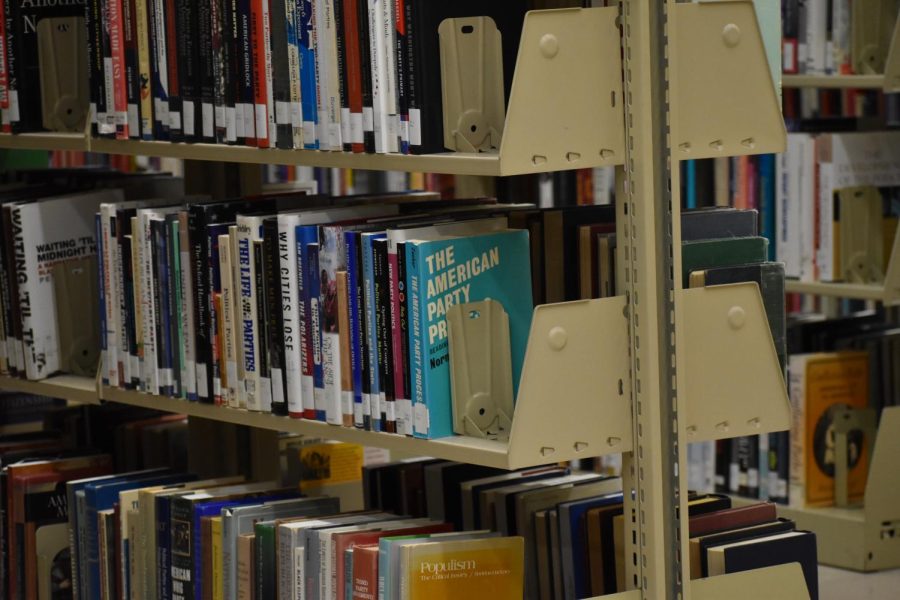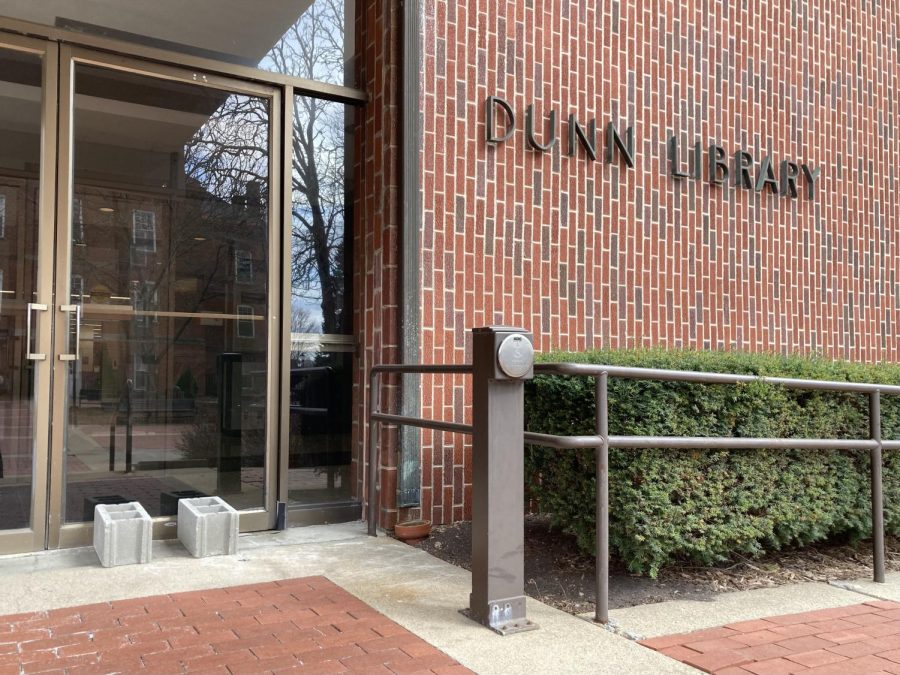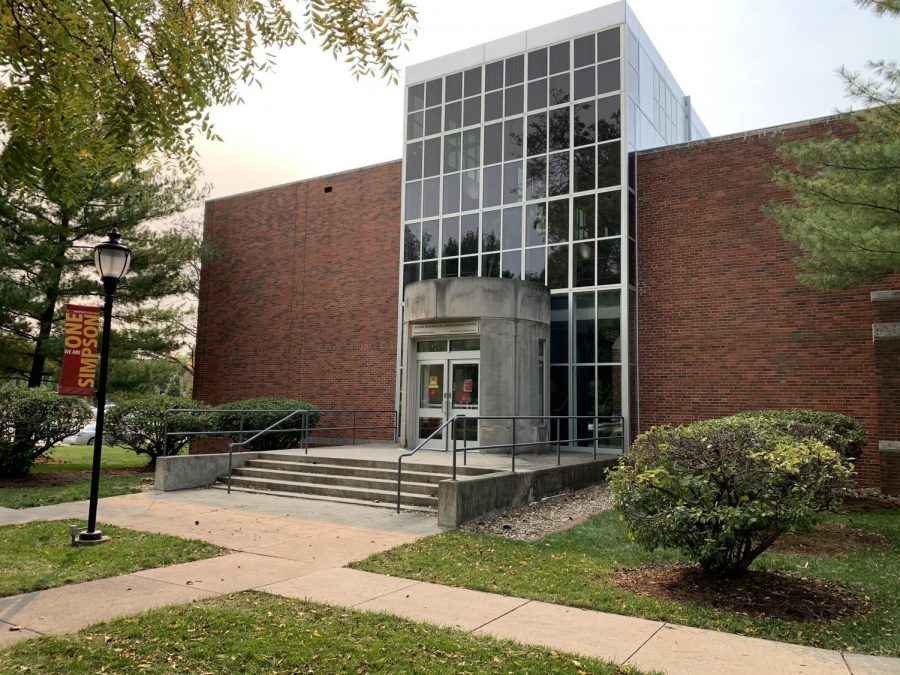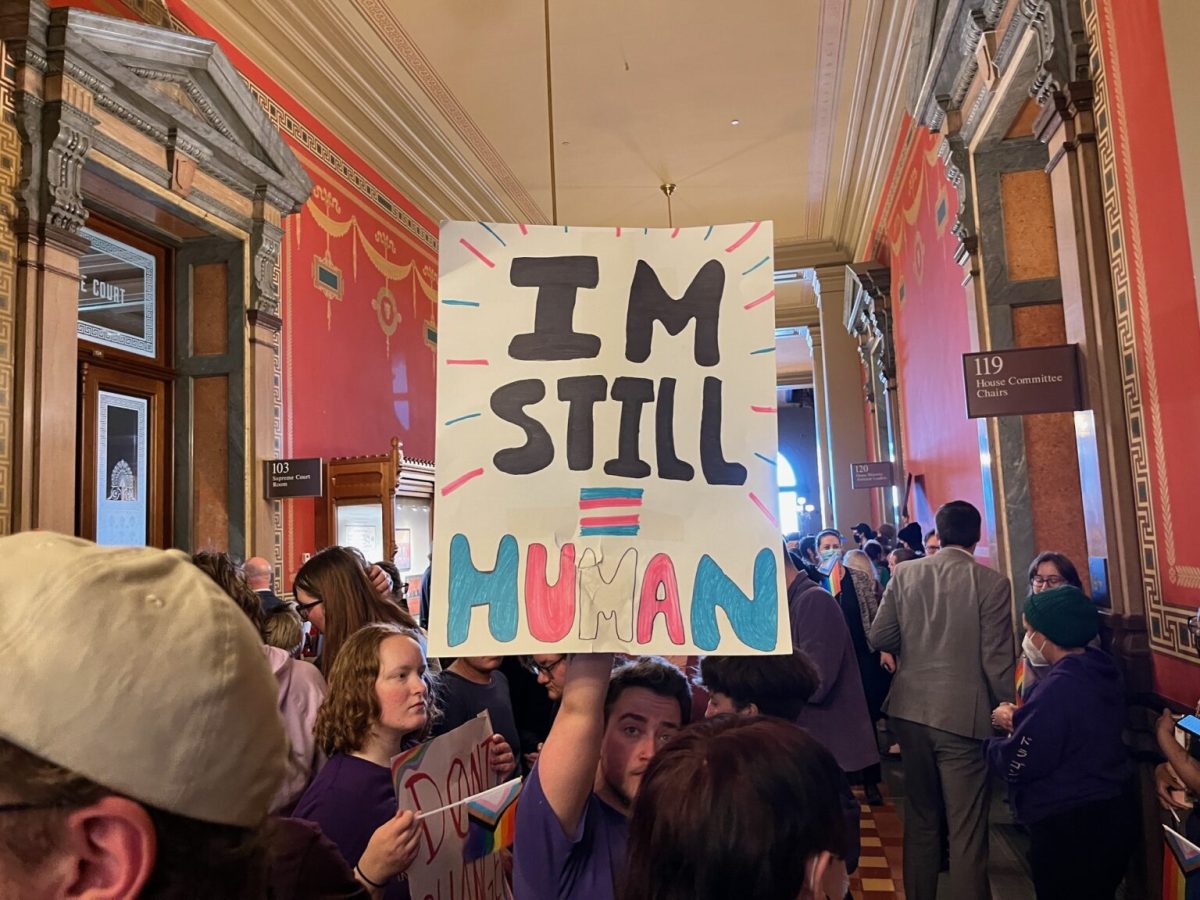Future and current educators at Simpson reflect on bill cracking down on ‘obscene’ books in Iowa
Close up of a book section in Dunn Library
March 2, 2022
A bill that would allow parents to sue Iowa teachers, librarians or school administrators for allowing students access to material deemed obscene or “hard-core pornography” was approved by the Senate Judiciary Committee, surviving the first funnel week of Iowa’s 2022 legislative session.
The bill, Senate File 2364, was proposed by Senate President Jake Chapman, R-Adel, in wake of concerns among parents regarding the content of certain books available in classrooms and libraries.
“It has become increasingly evident that we live in a world in which many, including our media, wish to confuse, misguide and deceive us, calling good evil and evil good,” Chapman said before the session began on Jan. 10. “One doesn’t have to look far to see the sinister agenda occurring right before our eyes.”
Chapman plans to introduce an amendment to SF 2364, which would align the penalties for teachers with that of the Iowa code for the rental or sale of hardcore pornography: an aggravated misdemeanor on the first offense and a Class D felony on the second offense.
Book challenges and concerns about obscenity in Iowa schools primarily grew from politicians and parents within central Iowa school districts—namely Ankeny, Johnston, Urbandale, Waukee and West Des Moines.
The bulk of challenged books and material are by LGBTQ+, Black and Hispanic authors, leading some on the opposition to dispute the true obscenity of challenged material. Many feel these books are taken out of context and have substantial literary and educational value, which may help students navigate their own lives and identities.
Keenan Crow, director of policy for One Iowa, an LGBTQ advocacy group, spoke out about the issue of context with challenged books in an article for the Des Moines Register. They illustrated their point by reading a Bible excerpt that describes sexual relations between a man and his daughters.
“I don’t think that just because this story is in the Bible that the Bible is about rape, incest or any of those other things,” Crow said in the article. “That’s why we have the test to take the work as a whole and examine it for literary, scientific or other types of value. So I don’t believe that there is pornography in our schools today.”
The U.S. Courts system uses the Miller Test to determine obscenity along the following criteria: (1) whether ‘the average person, applying contemporary community standards’ would find that the work, ‘taken as a whole,’ appeals to ‘prurient interest’ (2) whether the work depicts or describes, in a patently offensive way, sexual conduct specifically defined by the applicable state law, and (3) whether the work, ‘taken as a whole,’ lacks serious literary, artistic, political, or scientific value.
There are already procedures in place that allow parents to voice their concerns, object to and call for a reconsideration of educational materials within school districts, along with obscenity laws codified in Iowa Law.
JJ Butts, associate professor of English at Simpson, weighed in on this legislation; he feels it attempts to set up an unnecessary pathway for obscenity claims–one likely to be unsuccessful and cause problems for the school districts.
“I think the challenge here is that there are already pathways within almost all school districts to challenge a book. So why raise the stakes to suits, right? Obscenity laws haven’t changed, so it strikes me that what’s happening here is a form of encouraging harassment,” Butts said. “They’re setting up a situation that encourages people to take on lawsuits, that they’re not likely to win, but will impose a lot of hardship on the school districts.”
Butts also said these bills are going to create an atmosphere of confusion that is unhelpful to education, especially for marginalized students.
“It’s going to create a lot of confusion about what’s acceptable and what’s not acceptable,
Butts said. “I think this results with librarians and school districts not providing age appropriate materials for populations that are going to need them. A lot of times the books that get challenged regularly are books pertaining to LGBTQIA+ issues or books that are specifically dealing with populations of color.”
One challenged book in particular, “All Boys Are Not Blue” by George M. Johnson, is a memoir of Johnson’s journey growing up as a queer Black man. Iowa parents, in addition to Chapman and Governor Reynolds, often use a short excerpt detailing Johnson’s sexual assault to generate support for book banning and obscenity legislation.
Throughout the memoir, Johnson shares how he was able to heal and overcome his trauma, leading some to think these excerpts are taken too far out of context, and are used to evoke a sense of disgust among other Iowa parents.
“I think to a certain extent, the purpose of the bills is more political than it is designed to create community security,” Butts said. “I think it’s fair to raise questions about whether or not a book is age appropriate. I think it’s also important to recognize that these books often help people who are otherwise ignored; they can help folks reflect on what their life is, what their life could be and understand experiences they’re going through, things a community might not even attempt to cover.”
Since surviving funnel week — the deadline for bills introduced in one chamber to receive full committee approval — SF 2364 will continue in the legislative process.
Future Educators Weigh In
Senior elementary education major Naryah Moore condemns any type of legislation aimed at stifling teacher’s curricula is harmful—whether it concerns obscenity or topics like Critical Race Theory, another area of literature that’s been challenged nationwide.
“It scares me because people don’t see what goes into teaching. We’re here to build citizens that can be kind contributors to the world, and this happens through learning the true facts behind history,” Moore said. “Especially in elementary education, students learn these things through books, so when there’s potential for courts to get involved or when educational, truthful books are politicized, it scares me as a future teacher.”
As Black woman, Moore believes it’s critical that young students have access to material that represents and allows them to explore their identities.
“When it comes to material about race, ethnicity and sexuality–these are the topics that parents especially attack. Being Black, I want to make sure that these materials are taught in my classroom,” Moore said. “These bills may prevent students from seeing themselves in a book. Learning about representation and real truths may be hard, but it’s important that kids are exposed to it, or they’ll miss out on education long-term.”
On the issue of transparency within schools, senior secondary education major Hunter Brashaw says this kind of legislation is unnecessary, noting that school districts already have procedures in place for parents to voice concerns.
“School board meetings are open to the public. If a parent has a concern, most of the time they’re not alone—use those settings to voice your concerns instead of making someone else’s life difficult,” he said.
Brashaw plans to teach math, an area that often contains little literature-based material within its curriculum. Still, he sees this issue as an attack on teachers.
“I don’t think the arguments behind this bill are very good, I just think they’re trying to attack teachers in a way,” he said. “I think they’re trying to use fear. I don’t think it’s an issue of transparency. Why include the lawsuit? Most educators aren’t getting into this to screw over kids, that’s not what’s going on.”
When reflecting on the graphic excerpts from heavily-challenged books, Brashaw thinks the material should be viewed as educational tools.
“This kind of stuff exists, so these books are more like educational tools made to make people aware of topics. There’s a line to be drawn in schools, but it’s not like teachers are putting 50 Shades of Gray in schools, because it’s just not needed. I don’t think there’s any problem with this memoir as an educational tool.”
Looking ahead, Moore said she’ll welcome conversations about her classroom material with parents.
“I’m always willing to hear someone’s side of the story. If you think there’s a problem in the classroom, I’d love to address it. I’m just here for the kids,” Moore said. “I feel like there’s something else going on [with SF 2364], though. They’re trying to add more procedures and technicalities when I think it’s really just an issue of people’s conflicting opinions.”
As book banning continues to be a widely contested issue nationwide, Butts said there are better ways to determine what’s appropriate and inappropriate material for classrooms.
“This isn’t an either-or issue, both teachers and students suffer because of it. It makes it very difficult for teachers to do their jobs and it denies students — particularly vulnerable students — really important information,” Butts said. “I think it’s fine for parents to be involved in their kids’ education, but there are 100 other ways of doing this that would be less damaging to teachers, students and the teacher-community relationship.”







